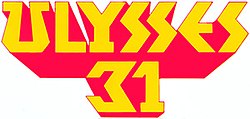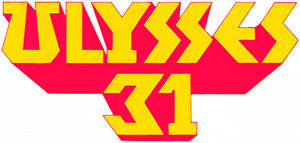Ulysses 31
French-Japanese animated television series From Wikipedia, the free encyclopedia
Ulysses 31 (Japanese: 宇宙伝説ユリシーズ31, Hepburn: Uchū Densetsu Yurishīzu Sātīwan, lit. "Space Legend Ulysses 31", French: Ulysse 31) is an anime series (1981) that updates the Greek mythology of Odysseus (known as "Ulixes" or "Ulysses" in Latin) to the 31st century. The show comprises 26 half-hour episodes as a co-production between DIC Audiovisuel and Tokyo Movie Shinsha.[1]
| Ulysses 31 | |
|---|---|
 | |
| Genre | Science fantasy |
| Created by | Nina Wolmark and Jean Chalopin (inspired by Homer's Odyssey) |
| Written by | Nina Wolmark Jean Chalopin |
| Voices of | Matt Birman Adrian Knight Anick Faris Kelly Ricard Howard Ryshpan Vlasta Vrána |
| Country of origin | France Japan |
| No. of episodes | 26 |
| Production | |
| Producers | Jean Chalopin Yutaka Fujioka |
| Running time | 25 min NTSC 24 min PAL |
| Production companies | DIC Audiovisuel Tokyo Movie Shinsha |
| Original release | |
| Network | FR3 (France) ANN (Nagoya TV) (Japan) |
| Release | 10 October 1981 – 3 April 1982 |
Premise
The series follows the struggles of Ulysses and his crew against the divine entities that rule the universe, the ancient gods from Greek mythology. The Gods of Olympus are angered when Ulysses, commander of the giant spaceship Odyssey, kills the giant Cyclops to save a group of enslaved children, including his son. Zeus sentences Ulysses to travel the universe with his crew frozen until he finds the Kingdom of Hades, at which point his crew will be revived and he will be able to return to Earth. Along the way they encounter numerous other famous figures from Greek mythology, given a futuristic twist.
Main characters
- Ulysses (ユリシーズ, Yurishīzu) is the main character and captain of the Odyssey. A well regarded and very esteemed space explorer and adventurer, Ulysses achieved the solar peace (a monumental accomplishment as implied in the series) becoming even more celebrated. Some time later he accidentally became the target of the Olympian gods' revenge by slaying the giant Cyclops, Poseidon's creature, in order to save his son Telemachus', Yumi's and her brother Numinor's lives. His weapon is a laser pistol that conceals an energy blade, complemented by an energy shield and a belt that allows him to fly. Ulysses is brave, noble, determined, and will stop at nothing to defeat the gods.
- Telemachus (テレマーク, Teremāku) is the son of Ulysses and second in command for most of the voyage. He is Yumi's friend and protector. He is a skilled pilot, and his weapon is a high-tech magnetic slingshot.
- Yumi (ユミ, Yumi) Thémis in the original French dub (after Themis the ancient Titan), a light blue-skinned humanoid alien girl from the white planet, Zotra, she is the younger sister of Numinor and possesses telepathic powers. She is saved from being sacrificed to the Cyclops, along with Telemachus and her older brother, by Ulysses. She exhibits telekinesis and is immune to fire. Although physically very frail, she is very intelligent and courageous. Zotrians, aside from blue skin, have snow-white hair, pointed ears, and slanted eyes with cat-like vertical pupils.
- Numinor (ユマイオス, Yumaiosu) Noumaïos in the original French dub, a Zotrian teenager and older brother of Yumi, he is saved by Ulysses from being sacrificed to the Cyclops. He is in suspended animation along with the rest of the crew for most of the series. His Japanese name Yumaiosu is the katakana orthography of English pronunciation of Eumaeus, the pig-guardian of Odysseus in Homer's poem.
- Nono (ノノ, Nono) is the small robotic companion of Telemachus. Fond of eating nuts and nails, he is a trusty friend who was given to Telemachus as a birthday present. He is skilled at machinery repair and possesses tremendous physical strength.
- Shirka (シルカ, Shiruka) is the Odyssey's main computer, with a deep female voice.
- Zeus (ゼウス, Zeusu) is the god of gods, persecutor of Ulysses.
- Poseidon (ポセイドン, Poseidon) is the god of the Seas, enraged by Ulysses's killing of his creature, the Cyclops. He wields a trident, the symbol of his power, and his servants pilot ships that are shaped like a trident.
- Hades (アデス, Adesu) is the ruling god of the Underworld. Ulysses must find his realm to find the way back to Earth.
Episodes
Summarize
Perspective
Pilot
In 1980, TAF, TMS Entertainment, and DiC Audiovisuel produced a pilot for the series, simply titled "Ulysses 31".[2] Although there was a Japanese VHS release of the series by King Records in 1986, the pilot never saw an official home release and was used for internal use only.
The pilot has long been considered as only been recorded in Japanese, until a French searcher discovered a copy of the French version in July 2015, then a copy of the English-dubbed version in June 2022.[3]
The story is virtually identical to episode one of the finished series, but the story was the only thing that was kept. Some characters underwent major redesigns from a typical anime design to the finished series, which is a mix of Japanese anime style and European art based on the appearance of classical Greek sculpture.[2] Renowned Japanese illustrators and animators Shingo Araki and Michi Himeno, who have worked in anime adaptations of famous manga (such as Masami Kurumada's Saint Seiya, Fūma no Kojirō, Ring ni Kakero, Riyoko Ikeda's Versailles no Bara, and UFO Robo Grendizer OVA) were responsible for the finished series' character designs, animation routines, and visual style.
Soundtrack
Most of the original soundtrack was composed by Denny Crockett and Ike Egan. Six additional themes were composed by Shuki Levy and Haim Saban: "Potpourri", "Final Glory", "Space Traffic", "Ulysse Meets Ulysse", "Mermaids", and "Change of Time (Theme of Chronos)".
The Japanese version has a different soundtrack. The music was composed by Wakakusa Kei, who made the soundtrack in both the series and pilot that was produced in 1980. An official soundtrack was released in 1986 on vinyl and on CD in 1988 by King Records.
Japanese theme songs
- Opening
- "Ginga Densetsu Odyssey" (銀河伝説オデッセイ, Ginga Densetsu Odissei, Galactic Legend Odyssey) by Tomoaki Taka
- Ending
- "Ai. Toki no Kanata ni" (愛・時の彼方に, Love, Over the Other Side of Time) by Tomoaki Taka
Cast
- Japan (original cast)
- Ulysses: Osamu Kobayashi
- Telemachus: Yū Mizushima
- Yumi: Sumi Shimamoto
- Nono: Mayumi Tanaka
- Zeus: Shōzō Hirabayashi
- Japan (1992 NHK BS-2 cast)
- Ulysses: Masane Tsukayama
- Telemachus: Nobuo Tobita
- Yumi: Akiko Yajima
- Nono: Miki Narahashi
- Zeus: Kan Tokumaru
- France (original cast)
- Ulysses: Claude Giraud
- Yumi: Séverine Morisot
- Telemachus: Fabrice Josso / Jackie Berger
- Nono: Jacques Ebner
- Shyrka: Évelyne Séléna / Sylvie Moreau
- Zeus: Jean Topart
- English (original cast)
- Ulysses: Matt Birman
- Yumi: Anick Faris
- Telemachus: Adrian Knight
- Nono: Howard Ryshpan
- Shyrka: Kelly Ricard
- Zeus: Vlasta Vrána
Release
In the United States, the show was broadcast as a half-hour segment in the 1986 anthology series Kideo TV.[4]
In the United Kingdom, it first aired on BBC One at 16:30 on Thursday, November 7, 1985.[5] The entire series was released in English in a complete DVD box set in the UK released by Contender Entertainment, and in Australia by Madman Entertainment. In the United States, one DVD titled Ulysses 31: The Mysteries of Time was released, containing only four selected episodes. The rights, like most of DIC's other programs, were originally owned by WildBrain, through its in-name-only unit, Cookie Jar Entertainment.
References
Further reading
External links
Wikiwand - on
Seamless Wikipedia browsing. On steroids.
